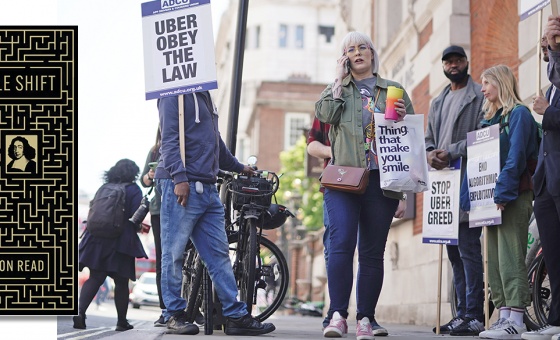This is the last article you can read this month
You can read more article this month
You can read more articles this month
Sorry your limit is up for this month
Reset on:
Please help support the Morning Star by subscribing here
HANNAH BLYTHYN started our conversation by telling me about growing up in a working-class community in Flintshire, north Wales, and her early trade unionism experience.
“I think like most people in my generation I was probably influenced by the decimation of our traditional industries across north Wales. I had one granddad who worked at the steelworks in Shotton and then my Taid, my other granddad, worked in a colliery.
“I spent a lot of time with my granddad who worked at the steelworks when I was little and he would talk to me about the solidarity of unions, the importance of collectivism and I guess that even as a small child, that really started to seep into my psyche.
“I was going home after university to try and pay off some of my debts and Alyn and Deeside Labour MP Mark Tami offered me a job and the opportunity to move to London.”
Hannah moved on while in London and then worked for one of Unite the Union’s forerunners, Amicus.
“When I first came back to Wales I was a regional political officer and then I became the first political and policy head for Unite Wales.”
We talked about how devolution began to have an impact on trade unions and how Unite interacted with the Welsh government.
“I think that was the start of unions in Wales recognising devolution had evolved and the need to have a political focus in Wales and not just at UK national level.
“This was in the early days when you had the UK coalition government and one thing that springs to mind is the abolition of the Agriculture Wages Board and being able to work here to try and campaign to try and stop it.
“When it was abolished I was part of the work to have it replaced by what is now the Agriculture Advisory Panel in Wales.”
Hannah was with Unite for 10 years so I asked why she decided to move from being a union official with influence to standing as a Labour candidate for the Welsh Parliament.
“If you told me 15-16 years ago I would end up doing this, I would not have believed you. Because not only did I grow up thinking that a politician wasn’t somebody like me, but it also wasn’t an option.
“I also hated public speaking, which is a bit of a barrier if you want to go into public life. But it was the trade union movement that helped me with that, giving me not just the support and training, but the platform to practise and to believe that I could actually do it.
“So that’s why I say they not only shaped my values in terms of my background and where I come from and where my political priorities are, but also in terms of actually, literally, helping give me my voice.”
Hannah became a deputy minister after just 18 months as a new Senedd member and was then given the task of bringing social partnership into law.
“This is landmark legislation, but it’s also very different in that we’ve developed it in social partnership. Which does mean a different way of doing things and sometimes that can take longer and you have to have those discussions with people.
“I think what was helpful for me was that I already had a relationship with a lot of the union people I was meeting.”
I mentioned the recent wave of public-sector pay strikes in Wales and whether that had threatened the Welsh government’s relationship with trade union social partners.
“I completely understand the position that public-sector workers have found themselves in after 13 years of austerity and the impact that it’s had on our public services and the people that provide those services.
“So I understand those frustrations and I feel acutely the limitations on our borrowing powers, the financial settlement for Wales and the straitjacket that places upon us.
“It has been a challenging time, but we have managed to maintain dialogue throughout on pay and in terms of working through the legislation.”
I asked the minister what she thought were the lessons the rest of Britain could draw from social partnership in Wales.
“Social partnership is a way of working rather than legislating industrial rights. We have always said it’s a Welsh way of working, so perhaps the principles of social partnership could be taken and used elsewhere, but then it needs to be moulded to fit the situation.
“We’ve always been proud as a government to promote trade union membership. And being in a union is the best way to protect your rights at work, but also to access opportunities through things like the Wales union learning fund — which we still have, but sadly not in England because it was axed by the UK government.
“Wales is the only nation in the UK where trade union membership has increased. And I don’t think that’s a coincidence.”











